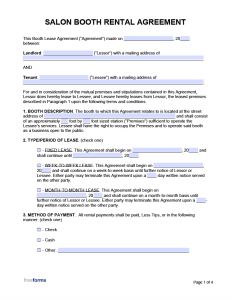
The commercial lease agreement is a notorious real estate form frequently carried out by those who would like to rent space to use for their business interest. It allows the owner of the property and the party interested in buying to record how the tenancy will transpire. Significant details relative to the sale will include the length of time the tenant will have the right to occupy the premises, what structure will be used to pay the expenses (gross, modified gross, triple net), and whether or not there will be an option to renew. Typically, these matters will be discussed by the two (2) parties or their agents prior to the contract’s execution. If both sides can come to an agreement on the terms, the contract may then be signed to secure a binding arrangement. (It is highly suggested that all signatures be performed while under the observation of a notarial figure for certification purposes.)
Commercial Rental Application – When considering a prospective tenant, the landlord of a commercial property should seek the security of a low-risk candidate for the occupancy. One way to gather data on a possible lessee is to evaluate via a rental application. This instrument can obtain specifics about them that are related to their previous rental locations, income generated, and credit history for the purpose of demonstrating their worthiness to rent.

Booth (Salon) Rental Agreement – A form used to document the renting of a small space within a larger commercial property, specifically used for those carrying out services related to the massage and cosmetology fields.
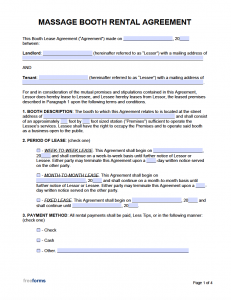
Booth (Massage) Rental Agreement – Allows the lessor, usually the proprietor of a business that offers massage services, to lease a portion of a larger property to the lessee who will be using the area to conduct therapeutic services for a fee.
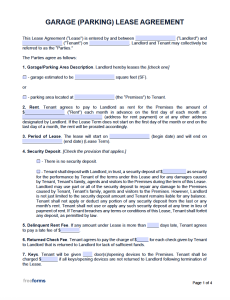
Garage (Parking) Rental Agreement – A consolidated outline of the rights and expectations associated with the rental of a parking space to store a vehicle.
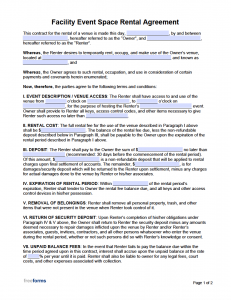
Facility Event Space Rental Agreement – Assigned paperwork that transcribes the pertinent information of an accord to rent out space to be used for an event or party.
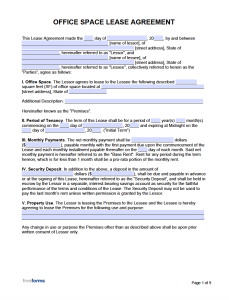
Office Space Lease Agreement – A valid contract to record the corroborating details concerning a rental property (or segment of a rental property) for a company’s office needs.
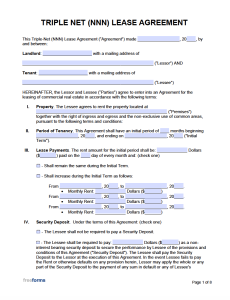
Triple-Net (NNN) Lease Agreement – A type of commercial lease where the tenant is responsible for paying the rent as well as all the property’s additional expenses, e.g. taxes, building maintenance, and insurance.
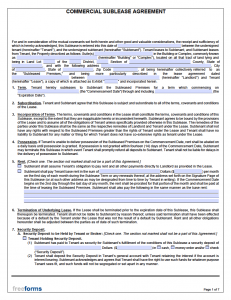
Commercial Sublease Agreement – A register presented as a source to transcribe the particulars of a lease where a tenant wishes to transfer their rights to occupy the premises to a subtenant.
Unlike residential property where the main goal is to live on the premises, commercial property’s main function is to accommodate a business’s operational needs. But, not all real estate can be converted to commercial property, it must be located within a certain area that is zoned accordingly. Also, there are different kinds of zoning for the different types of commercial properties. The main types being:
(Retail and office properties are commonly zoned under the same category, whereas industrial space is zoned under a separate classification.)
Before getting involved in the rental of commercial space, whether you are a landlord or tenant, it is imperative that you have a basic understanding of the corresponding lease agreement. The first thing that you should be aware of is the different types of lease structures in terms of how the expenses are handled. These being:
The process of leasing commercial real estate is more intricate than renting out a residence. That is why most people in the industry recommend that any owners of commercial space should hire the services of a real estate agent who specializes in this field (their commission fees will usually run from 3-6% of the total lease payments during the initial term). With that being said, it is not an impossible endeavor to try to lease the premises yourself. If this interests you, refer to the steps below to help guide you through the process of leasing your own commercial property.

What is the value of your property? To answer this question, you are going to want to:
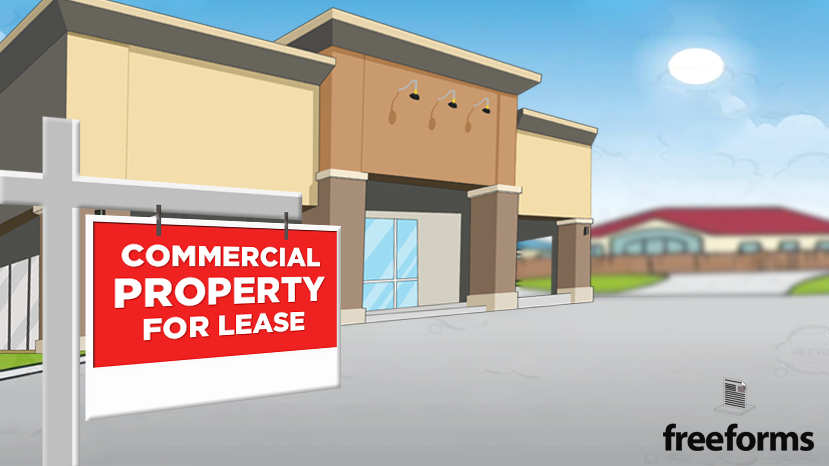
Now that you have a price in mind, it is time that you properly market the property in order to find a tenant to occupy the space. You may want to consider:

Hopefully, if your property is appropriately priced, you will be contacted by individuals interested in your property. Be sure to promptly answer any phone calls and emails concerning your ad. It is only a matter of time before you will receive a request to view the space in person. In order to entice visitors to lease your property, you may want to:

Prior to carrying out the lease agreement, the prospective tenant will usually want to discuss the terms & conditions of the occupancy. The major components of which would include:
(Apart from these main factors of the rental contract are additional provisions that both parties should also read and acknowledge.)

If the parties were able to come to a meeting of the minds in relation to the aforementioned terms, it will be time to commence the execution of the commercial lease agreement. Once the details have been transferred to the contract, the participating individuals should offer the following in the presence of a notary public:
Upon the above actions being completed, the agent possessing notarial powers shall complete the two (2) designated sections (one (1) for the lessor and one (1) for the lessee).
Americans with Disabilities Act – ADA (42 U.S. Code § 12183) – Any business that serves the public or has fifteen (15) or more employees must equip their property with an entryway that is accessible to those with disabilities. This act should be included within the content of the lease agreement for the purpose of clarifying that the landlord and tenant both acknowledge this law that was put forth by the federal government.
Hazardous Waste (42 U.S. Code § 6901) – Individuals participating in a lease for commercial property may cite this law concerning the proper disposal of harmful waste materials as it pertains to the tenant’s trade. Landlords may also include a provision that states that the tenant is prohibited from having hazardous materials on the premises without their consent (sample clause).
When determining a commercial property’s annual or monthly rent, the square footage of the available space plays a major role in calculating the sum of the payments. But, there are some factors that have to be taken into account in order to get an accurate number. You must understand the difference between the following types of space:
Before you can calculate a property’s rent using the square footage, it is essential that you first establish the market rate for properties alike. Once you have a number in mind, you may review the terms and formulas below to better understand the process of computing the lease payments:
Entire Building’s Rentable Square Footage ÷ Entire Building’s Usable Square Footage = Load Factor Percentage
Landlord’s Useable Square Footage × Load Factor Percentage = Landlord’s Rentable Square Footage
Landlord’s Useable Square Footage + Landlord’s Rentable Square Footage = Landlord’s Total Square Footage
Landlord’s Total Square Footage × Price Per Square Foot = Annual Rent
Annual Rent ÷ Twelve Months = Monthly Rent
Business owners looking to rent space to provide their customers with the services and products they have to offer will need to educate themselves on the current commercial real estate climate. But, they will first need to determine what kind of property they require to function in an efficient manner. Narrow down the options by identifying the following aspects of your business model:
Now that you have an idea of what kind of space your business requires, you may research local properties that fit this description. Exploring what the market has to offer will also help you get a feel for what the going rate is per square foot. Once you feel you have a good understanding of the current marketplace, it will be time to view the properties of interest. Upon meeting with these owners (or their representatives), consider broaching the following subjects regarding the lease:
In addition to these factors of the lease are some clauses that tenants should try to either include or avoid. Read the sections below to better understand each contractual provision:
Keep in mind, negotiating the rental of multiple properties gives you the advantage when speaking with the owners of commercial real estate. The more options you have, the more you will be able to walk away if the owner doesn’t meet your demands. It should also be noted that it will be significantly easier negotiating with an independent landlord as opposed to a corporation. (You may also want to consider hiring the services of a qualified real estate agent or attorney to advise you on the many facets of commercial real estate.)
When owning and operating a business, there is always a chance of things going awry. Individuals never intend on having to break a lease, but it is something that may have to occur if they can no longer afford the tenancy. It can also happen if the tenant’s business is a success and they need to upgrade to a larger facility. If you are contemplating backing out of your lease obligations, you may want to first consider some of the following measures that can be taken to lessen the blow of ending the contract early (this section can also help those about to enter into a contract, as it provides information on how to implement certain things that could protect you in the future):
When a tenant of a commercial property is currently renting out space that is purchased by a new owner, they may wonder if they can be kicked out upon the transfer of proprietorship. The short answer is no. All new owners of commercial property are obligated to follow through with the terms & conditions of any existing lease agreements. The only way they would be able to terminate a lease upon the transfer of ownership would be if the original contract contained a provision that permitted such an action.
This depends on the type of commercial property and zoning it falls under. Some commercial property falls under the category of “residential use” and permits individuals to reside within the premises, e.g. apartment buildings and hotels. On the other hand, retail and office space is used strictly for “commercial use” and does not allow individuals to live within the boundaries of the property. Individuals who get caught dwelling within a commercial property where it is not allowed may be liable to pay certain fines in connection with the law.
Every state & city within the U.S. is divided into sections that dictate what type of properties can be built/exist within their boundaries. The main types of zoning include:
Even though there is a category specifically referred to as “commercial zoning”, certain types of commercial properties can fall under other categories as well. Individuals looking to acquire commercial space should research their local laws in regard to the zoning that applies to their business.